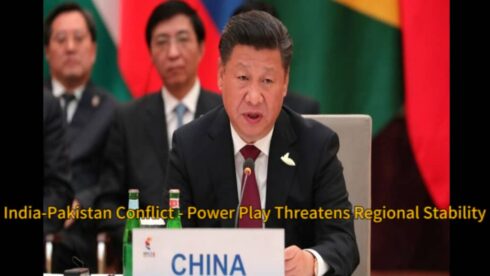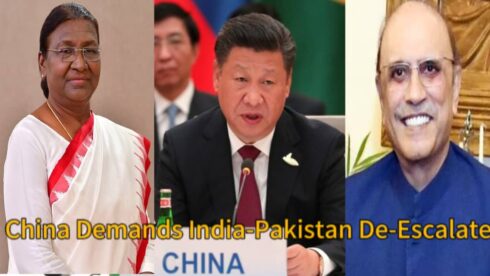China’s has officially urged Pakistan and India to exercise “maximum restraint” and engage in immediate dialogue to prevent a full-scale confrontation along their contentious borders. This diplomatic call comes in response to renewed skirmishes in the Kashmir region that have resulted in significant casualties and heightened fears of a regional war. The Chinese Foreign Ministry released a strongly worded statement on Saturday, emphasizing that “regional peace cannot be held hostage by unresolved historical grievances.”
China, a close strategic partner to both nations and an emerging superpower with expanding geopolitical interests in South Asia, expressed concern that continued aggression could destabilize its multibillion-dollar Belt and Road Initiative (BRI), which traverses through parts of Pakistan-administered Kashmir. Diplomatic observers believe Beijing’s involvement underscores a shift in China’s foreign policy approach—from silent observation to proactive conflict mediation in South Asia.
Beijing’s Strategic Interests Threatened by Escalating Indo-Pak Tensions
China’s call for de-escalation is not merely symbolic; its economic stakes in the region are directly endangered. The China-Pakistan Economic Corridor (CPEC), a flagship component of the BRI, runs through Gilgit-Baltistan, a disputed territory also claimed by India. Rising military confrontations between India and Pakistan risk derailing this infrastructure corridor valued at over $62 billion, potentially triggering delays and investor panic.
China, which typically maintains a neutral façade on South Asian disputes, appears to be recalibrating its stance due to increasing threats to its long-term strategic assets. Analysts suggest that Beijing fears being caught in the crossfire—economically and diplomatically—if the two nuclear-armed neighbors fail to cool tensions. For China, stability is no longer optional—it’s imperative.
India’s Retort Challenges Beijing’s “Mediation” Role
China’s intervention, however, has not gone unchallenged. The Indian Ministry of External Affairs issued a guarded but pointed rebuttal, asserting that “bilateral issues must remain bilaterally resolved.” India views China’s suggestion as a subtle encroachment on its sovereign decision-making and an indirect endorsement of Pakistan’s territorial claims, particularly regarding Kashmir and the Line of Control (LoC).
China’s complex relationship with India, particularly following the Galwan Valley clashes in 2020, casts a long shadow over its current efforts to act as a mediator. Indian defense analysts view Beijing’s diplomatic overture as a calculated move designed more to protect its own interests in Pakistan than to genuinely broker peace. This perception may further harden India’s stance against trilateral engagement formats.
Pakistan Welcomes Beijing’s Call, Seeks Multilateral Resolution

China’s statement has been warmly welcomed in Islamabad. The Pakistani Foreign Office commended China’s “constructive involvement” and reiterated its long-standing call for international mediation in the Kashmir conflict. Foreign Minister Ishaq Dar praised Beijing’s “principled stance” and expressed optimism that China could facilitate a sustainable diplomatic roadmap.
Pakistan has historically leaned on global powers, particularly China and the United Nations, to spotlight what it considers India’s “unlawful occupation” of Jammu and Kashmir. With China’s support, Islamabad is now expected to amplify its diplomatic campaign in global forums, potentially escalating geopolitical polarization in the region. Critics warn that China’s backing may embolden Pakistan rather than encourage genuine compromise.
Global Community on Edge as Nuclear Powers Square Off
China’s warning comes amid mounting global anxiety over the volatile dynamics between two nuclear-armed states. The United Nations and several G7 nations have echoed Beijing’s call for de-escalation, with the U.S. State Department urging “urgent diplomatic engagement.” The European Union, in a rare synchronized statement with China, noted that “escalation in South Asia could carry catastrophic consequences for global security.”
China, keen to portray itself as a responsible global leader, is seizing the opportunity to fill a diplomatic vacuum often left by the West in the region. However, international observers caution that China’s own geopolitical baggage with both nations complicates its neutrality. With no clear mediation mechanism in place, the world watches anxiously as a powder keg of historic animosity inches closer to detonation.
Diplomatic Crossroads: Can China Truly Broker Lasting Peace?
China’s latest engagement in South Asia raises critical questions about its evolving diplomatic identity. Is Beijing truly positioning itself as a peace broker, or are its overtures merely veiled extensions of statecraft rooted in self-interest? While China’s economic leverage gives it unprecedented access to both Pakistan and India, its credibility as a neutral actor remains under intense scrutiny.
With its eyes set on reshaping the global order and filling leadership voids left by traditional Western powers, China faces a delicate balancing act. Failure to navigate this crisis impartially may further inflame regional rivalries. Yet, success in even partially defusing Indo-Pakistani tensions could cement Beijing’s standing as a new-age global stabilizer—albeit one whose motives remain shrouded in strategic calculus.














